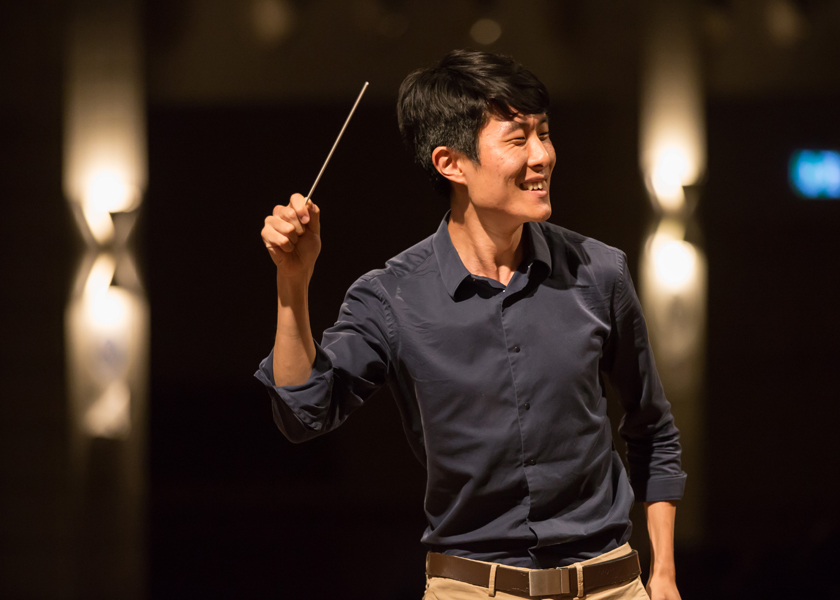U of M student conductor launches New York career with prestigious youth symphony | By Anne Holzman (Summer 2023)

Andrew Jinhong Kim took the podium at Ted Mann Auditorium in the fall of 2022 to conduct one of the required four concerts toward his doctorate in music. He chose Ralph Vaughan Williams’ Symphony No. 5, a piece not often heard in American concert halls. He introduced it with a quote from Henry David Thoreau: “Things do not change. We change.”
Kim drew warmth and expression from the University of Minnesota Symphony, the music school’s top orchestra. Typical of Vaughan Williams, the piece is full of staggered entrances and introduces harmonies that evade the familiar Romantic patterns and hearken back to earlier English sources. Kim and his players took all this on with confidence and delivered a performance comparable to a professional ensemble.
One year and several big transitions later, Kim is settling into life in Boston, where his wife, violinist Emily Scicchitano, is studying at the Boston Conservatory. Kim was hired last spring as music director of the New York Youth Symphony (NYYS), which performs at Carnegie Hall. It’s an auspicious start for a conductor just finishing his studies.
Kim was born in South Korea and lived there until he was 12, when his father, a broadcast journalist, was offered a year of study in the U.S. Kim’s father decided to study at Duke University and brought his wife and son to North Carolina. Andrew enrolled in a public middle school and enjoyed his time there so much that at the end of the year, he asked his parents to let him stay in the country. They had to return to Korea, but they found a boarding school for their son near Philadelphia.
At the time, Kim said, he wasn’t focused on music. He had been given a recorder to play in elementary school, didn’t have much success with it, and decided music wasn’t for him. “I didn’t like when I wasn’t good at something,” Kim admitted in an interview with Korean Quarterly in July. He attributed this to the way Korean culture has approached classical music training. “If you’re not a virtuoso in Korea,” he said, “you’re not encouraged.”
At his North Carolina middle school, he discovered that every student was encouraged to sign up for a music class, regardless of ability. His mother insisted that he learn clarinet – perhaps, he suggested, because she thought he ought to get over his early experience with the recorder. He loved his band teacher and grew in confidence until he was the third-chair clarinet in the school band.
At his new school in Philadelphia, Kim dropped clarinet and joined a choir. “I just needed to unlock music to myself in gradual steps,” Kim reflected. He went on to a different boarding school for high school, and in his junior year, he sang with a community chorus. He remembers an inspiring performance of the Mozart Requiem as the moment he grasped “the sense of one-ness” that would lead him into a musical career. “This,” he realized, “is why classical music exists.”
Parallel to his singing was a growing interest in literature, which Kim attributes to his father’s career as a writer. “The way we think is via writing,” he said. He entered Swarthmore College intending to double-major in English and music. He wound up one class short of the English major and committed himself to the music. By then he had served as a student conductor at Swarthmore, and he was accepted to Ithaca College for his masters in music. He met Scicchitano at Ithaca, who would follow him to Minnesota and perform with orchestras in Buffalo (Minnesota), and Sioux City, Iowa. They were married in fall 2022.
At the University of Minnesota, Kim had a teaching fellowship that included conducting the university’s Concert Orchestra program, which is open to non-majors and encompasses many levels of playing. He also conducted both the professional and youth orchestras of the Duluth Superior Symphony. While many conductors chafe at working with nonprofessional players, Kim said he loved working with students who had other priorities. “This is why I’m a conductor,” he said. “It’s not for the perceived glory. It’s one person sending me an email about how we rekindled their connection with music.”
Kim’s doctoral studies were heavily affected by the coronavirus pandemic, but he credited University of Minnesota music director Mark Russell Smith with making the most of a very difficult situation. University staff worked out ways for ensembles to rehearse in-person and safely as much as possible, which often meant breaking into smaller groups and coordinating the resulting fragments. As one of three conducting fellows, Kim said, “Mark Russell Smith gave us an incredible amount of podium time. Talk about turning adversity into opportunity!”
Speaking on the phone from his new home in Boston, Kim said he will commute to New York for NYYS rehearsals and concerts. He is finishing up work on his Doctor of Musical Arts degree in Minnesota, but even with those dual responsibilities, he’s going to have more free time than he’s enjoyed in many years. He said he is looking forward to attending concerts, reading for pleasure, and getting back to writing.
Kim said his dual interests in music and literature serve him well on the podium. “I think music expresses something that words can’t,” he said. To make that happen, he said, a conductor often has to start with the right words to describe what he’s looking for. “In rehearsal, my job is to describe something that’s indescribable.” He sometimes turns to literature, he said, because it’s the best way of “getting everybody to imagine something – that shared experience.”


